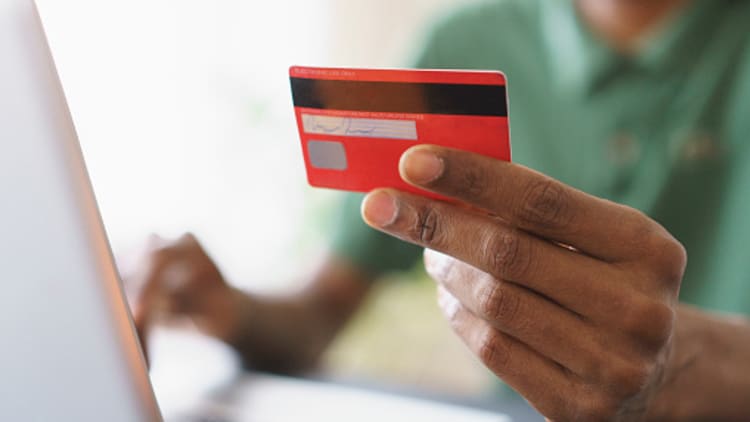Here's one New Year's resolution people think they'll stick to in 2019: Clearing their credit card debts.
More than 6 out of 10 participants in a recent survey by CompareCards.com said they are confident they will pay off their monthly credit card balances in full this year.
The personal finance site polled 1,066 people online in early January.
In particular, millennials are pretty confident they'll be able to pay off their card balances.
Seven out of 10 of these respondents say they anticipate being able to make their full payments more often this year.
"People are upbeat about paying their credit card bills because they feel comfortable in their jobs," said Matt Schulz, CompareCards' chief industry analyst, who conducted and analyzed the survey.
The overall unemployment rate — which was 4 percent in January — and rising wages are likely causes behind the upbeat attitudes, he said.
Positive sentiment aside, people's finances are still pretty grim: Only about 40 percent of participants in a survey by Bankrate.com said they would be able to cover a $1,000 surprise expense.
That personal finance site polled more than 1,000 people in January.
"The shutdown highlighted just how slim the financial margin of error is for many American families," Schulz said. "The sad fact is that many Americans are treading water when it comes to debt."
Credit card education
But how does this debt accumulate so quickly?
"There is a huge lack of education by the credit card companies on how quickly credit card debt can accumulate and how difficult it is to pay off," said Pamela Capalad, a certified financial planner and founder of Brunch & Budget in Brooklyn, New York.
"No one really understood how the annual percentage rate works," she said.
The annual percentage rate is the interest rate you're charged on a loan or credit card. A credit card can have multiple APRs, charging different rates for credit card purchases, cash advances and penalties.
Interest is not calculated based on a fixed balance; rather, it is calculated based on your average daily balance, said Capalad.
In other words, the balance you maintain on your card factors into how your interest is calculated.
Borrowers who are unable to make their monthly payments may be living beyond their means. They are also accumulating balances on their credit cards and accruing interest.
Slashing those big numbers
If you're set on paying off your credit card balance, be sure to stop habitually whipping out the plastic to make your purchases, said Capalad.
"Not using your credit card stabilizes the amount of debt you actually owe," she said.
Consider a strategy to pay off your credit card.
With the debt snowball method, you pay the minimum balances on each card and commit the extra cash to pay off your smallest debt first. This way, you eliminate the smallest balances first, which can help you free up resources to pay larger debts.
"I prefer the debt snowball method because even though it might technically cost a little more in interest, you see results much more quickly," Capalad said.
"It's much easier, especially when you're just starting to pay off debt, to tackle a $1,000 balance versus a $10,000 balance," she said.

Another strategy is the debt avalanche method, in which you begin by paying off the card with the highest interest rate first.
This way, you are reducing your most expensive debt first, and leaving the cards with the lowest interest rates for last. "I usually recommend using this method if all your card balances are pretty similar," said Capalad.
Create a long-term plan for your cash flow.
Examine your expenses and decide what one or two things you are spending too much money on. Think about how you can reduce those costs, provided they are not essentials, Capalad said.
"It's a matter of being deliberate about eliminating expenses that you think you don't necessarily need," she said.
Improving your credit score
While paying off your credit card is a good habit, closing it altogether could be harmful.
"Your credit score will go down when you close your card," said Capalad. "If you pay off your credit card, I recommend you should keep it open unless you have a very good reason for not."
You might want to consider closing a card if you're being assessed an annual or monthly fee just to keep the card, or if you have too many credit cards open at the same time, she said.
After paying off all your balances, you should think about ways to increase your credit score.
Your payment history typically accounts for 35 percent of your score, according to Fair Isaac Corp., creator of the FICO credit score.
That means if you faithfully make your payments on time, you could help improve your score.
You should also keep an eye on your credit utilization — the amount of credit you're using compared to the amount that you have available — which also affects your credit score.
Credit scoring companies prefer that you use no more than 30 percent of the credit available to you, according to Experian. This is an indication that you have a handle on your debt and you're keeping your spending in check.
More from Personal Finance
Why your vacation budget could still land you in the red
Bitcoin investors don't plan on telling the IRS about their losses
There's an upside to rising interest rates


